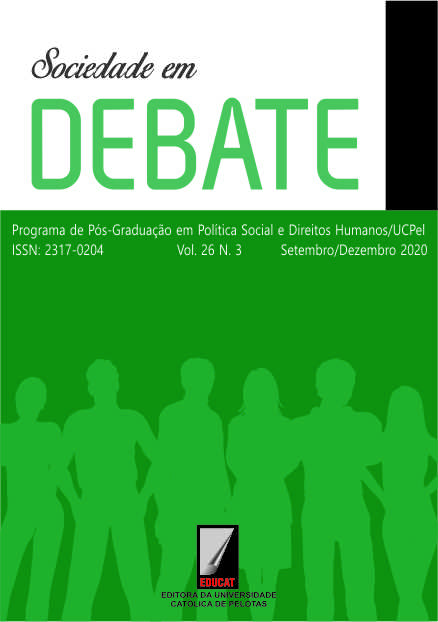Post-truth and the failure of truth: an analysis of national and international scientific literature
DOI:
https://doi.org/10.47208/sd.v26i3.2816Keywords:
Pós-verdade, Notícias Falsas, Democracia LiberalAbstract
The purpose of this paper is to analyze the national and international scientific production regarding the post-truth phenomenon. The review resulted in 145 articles that were categorized into six fields of knowledge. The analysis shows that the topic began to develop in 2016 - in the context of the USA elections and the EU referendum in the United Kingdom - and since then has spread and branched out. The theoretically ground is givern by Alain Badiou's philosophical discussion about the truth. In our understanding, the post-truth operates in a systematic way through strategies of covering and distorting reality. By proceeding in this way, it is seen as another manifestation of capitalism's agony, which erodes the institutional bases of liberal democracy, its institutions, and ideology, confronting normal science and the dominant public opinion, in favor of the interests of capital itself.
Downloads
References
ALEXANDER, Robin. 2019. Whose discourse? Dialogic Pedagogy for a post-truth world. Dialogic Pedagogy. 7, 2019, Vol. 0.
BADIOU, Alain. 2017. Em busca do real perdido. Belo Horizonte: Autêntica, 2017.
BURNS, James P, GREEN, Colin D. and NOLAN, Jaime. 2018. New genealogies and the courage of truth: Toward an ethics of adversarial public educational scholarship and policy activism. Education Policy Analysis Archives. 26, 2018, Vol. 0.
DEUTSCHMANN, Christoph. 2012. Capitalist Dynamics: A Sociological Interpretation. 2012.
HOFFMAN, Steve G. 2018. The Responsibilities and Obligations of STS in a Moment of Post-Truth Demagoguery. Engaging Science Technology and Society. 2018, pp. 444-452.
HOUAISS. 2019. Houaiss. Dicionário Houaiss. [Online] 07 18, 2019. https://houaiss.uol.com.br.
JAQUES, Cecilia, ISLAR, Mine and LORD, Gavin. 2019. Post-Truth: Hegemony on Social Media and Implications for Sustainability Communication. Sustainability. 11, 2019, Vol. 7.
KAPLANOVA, Patricia. 2017. Essay on legitimacy and democracy. Izzivi Prihodnosti. 2, 2017, Vol. 1, pp. 16-26.
KELLY, Ann and MCGOEY, Linsey. 2018. Facts, power and global evidence: a new empire of truth. ECONOMY AND SOCIETY. 2018.
KEYES, Ralph. 2019. ralphkeyes.com. [Online] 07 16, 2019. https://ralphkeyes.com/book/the-post-truth-era/.
MOLIÈRE. 2003. O doente imaginário. [trans.] Daniel Fresnot. São Paulo: Ed. Martin Claret, 2003.
OXFORD. 2019. OXFORD WORD OF THE YEAR 2016. Site Oxford Dictionaries. [Online] Julho 13, 2019. https://languages.oup.com/word-of-the-year/word-of-the-year-2016.
PARKER, Simon and RACZ, Marton. 2019. Affective and effective truths: Rhetoric, normativity and critical management studies. Organization. 2019, https://doi.org/10.1177/1350508419855717.
PLATÃO. 1985. A República - Livro VII. Brasília: UnB, 1985. pp. 39-86.
RAMIREZ, Carmen Hurtado. 2017. Contributions of music education to education for peace: searching for trans-truth in the post-truth era. Revista Electronica Complutense de Investigacion en Educacion Musical-Reciem. 2017.
RUAS, Jose and CAPDEVILA, Arantxa. 2017. Political communication today: challenges and threats. Communication & society-spain. 2017.
SPEED, Ewen and MANNION, Russell. 2017. The Rise of Post-truth Populism in Pluralist Liberal Democracies: Challenges for Health Policy. International journal of health policy and management. 2017, Vol. 6, pp. 249-251.
STREECK, Wolfgang. 2016. How Will Capitalism End? Essays on a Failing System. London/New York: Verso, 2016.
TESICH, Steve. 1992. A Government of Lies. [Online] 1992.
THIOLLENT, Michel Jean Marie and LIMA, Daniella Munhoz da Costa. 2020. A pós-verdade e a gestão: reflexões a partir do exemplo do Brasil. Sociedade em Debate (Pelotas). 1, 2020, Vol. 26, pp. 56-71.
WITTNEBEN, Bettina. B. F, et al. 2012. Climate Change and the Emergence of New Organizational Landscapes. Organization Studies. 2012, Vols. 33 - 11, page(s): 1431-1450.
Downloads
Published
How to Cite
Issue
Section
License
Copyright (c) 2020 Thaís Cristina Felipelli Vaquero, Renê Birochi, Gabriela Gonçalves Silveira Fiates

This work is licensed under a Creative Commons Attribution-NonCommercial 4.0 International License.



